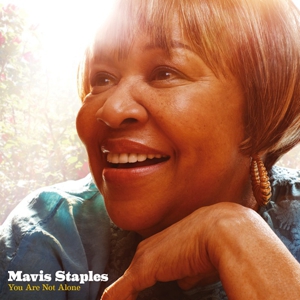Tag Archives: VeeJay
MAVIS STAPLES: A Tribute to a legend
Mavis Staples is a living legend. Over the past 60 years she’s not only brought Gospel music to the masses but she’s also been a voice of hope and strength for those fighting for Civil Rights. Her career started in Chicago during the late 1940’s when she and her siblings would perform in churches alongside their father, the legendary Roebuck “Pops†Staples. With a sound that was rooted in Southern Gospel and Delta Blues “The Staple Singers†soon became local favorites and in the early 50′s began recording sides for labels like VeeJay, Riverside, and Checker. In addition to gospel music fans the band was also embraced by the folk music scene during the folk revival of late 50′s and early 60′s. It was during this time that the band became very active in the civil rights movement and regularly performed at rallies and events hosted by Dr. Martin Luther King.
In the late 60′s and early 70′s the music scene was changing and the band changed right along with it. They signed with the legendary STAX Records and under the guidance of STAX A&R man Al Bell they started adopting more of a Soul-Gospel style. Their music might have become a little funkier but it still contained the same message of hope, love and compassion. Songs like “Respect Yourself“, and “I’ll Take You There†made the band a household name and catapulted them into stardom. Unfortunately, due to some questionable business decisions by Al Bell STAX Records filed for bankruptcy in 1975 and was forced to shutdown.
The Staples pressed on and over the next several years put out several releases for a variety of different labels. While they had success with their 1975 album LET’S DO IT AGAIN the group mostly was out of the spotlight until the 1990’s. During the 2000’s Mavis continued to perform and release solo albums. Paired with producers such as Ry Cooder and Wilco’s Jeff Tweedy, these records introduced Mavis to a whole new audience. In 2013 her Jeff Tweedy-produced album You Are Not Alone won a Grammy for “Best Americana Album”.
This year Mavis will turn 75 years young and she’s just as popular as ever. People all over the world still cram into venues to see her perform and she’s a regular musical guest on late-nite TV. Her music still carries with it a message of hope and tolerance. A message that reminds us that even though there have been victories in the struggle for civil rights, the fight is far from over.
STAPLE SINGERS/MAVIS STAPLES SUGGESTED LISTENING
The Staple Singers: Uncloudy Day (VeeJay)
The Staple Singers: Freedom Highway (Epic/Legacy)
The Staple Singers: Be Attitude: Respect Yourself (Stax)
The Staple Singers: The Staple Swingers (Stax)
The Staple Singers: The Best of The Staple Singers (Stax)
Mavis Staples: We’ll Never Turn Back (Anti) produced by Ry Cooder
Mavis Staples: You Are Not Alone (Anti) produced by Jeff Tweedy
Mavis Staples: One True Vine (Anti) produced by Jeff Tweedy


